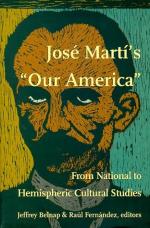|
This section contains 2,963 words (approx. 10 pages at 300 words per page) |

|
SOURCE: "The Cubans and Hostos," in A Century of Latin-American Thought, Harvard University Press, 1944, pp. 218-46.
In the following essay, Crawford reviews Martí's life and thought and the different meanings he has held for different audiences. Ultimately, Crawford describes Martí as "a mystic, but a practical one; a Utopian but at the same time a realist."
It is significant that even in the Homenaje to Varona about half of the pages are devoted to the man who in a spirit that was all flame and a life that was given single-heartedly to Cuba and to freedom summed up the most generous aspirations of his people. In spite of the forty-two volumes of his collected works, "the most extraordinary work which Martí left was not books, but his own life." 30
José Martí (1853-1895) was born in Cuba, the son of immigrants from Spain. In Cuba he passed the...
|
This section contains 2,963 words (approx. 10 pages at 300 words per page) |

|


